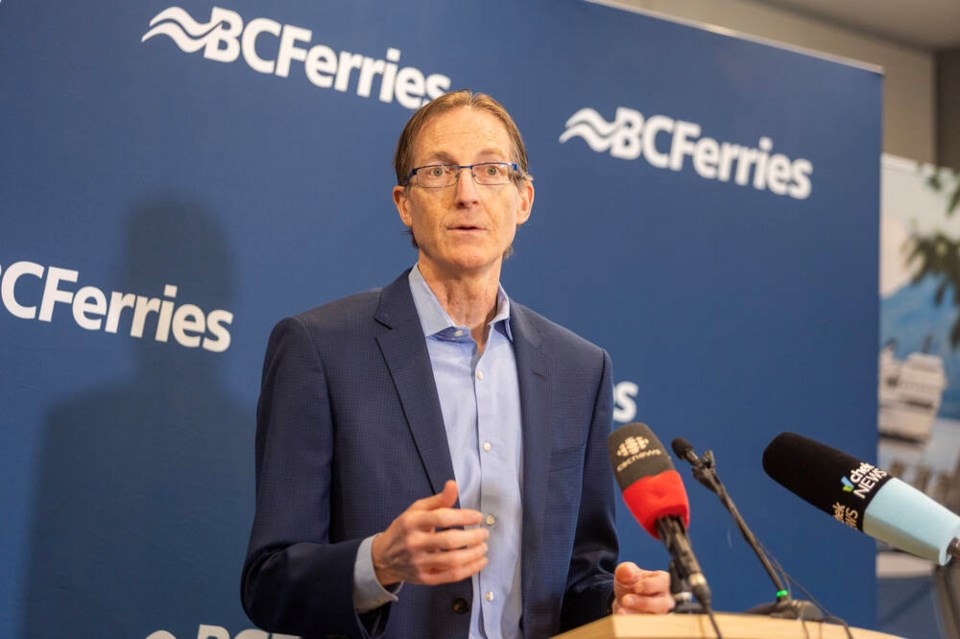B.C. Ferries’ CEO says he isn’t worried that a major ferry order with a state-owned Chinese shipyard might become a bargaining chip between China and Canada if trade and diplomatic tensions between the two countries worsen.
The ferry company’s decision to go with China Merchants Industry Weihai Shipyards to build its four new ferries quickly drew criticism from both sides of the aisle in the B.C. legislature after it was announced Tuesday.
Transport Minister Mike Farnworth said in a statement that he worries about procuring services from “any country that is actively harming Canada’s economy” with tariffs and protectionism.
Beijing imposed retaliatory tariffs on Canadian canola and meal, peas and seafood in March after Ottawa slapped levies on Chinese-made electric vehicles, steel and aluminum.
Farnworth, whose office declined a request for an interview, said while B.C. Ferries is an independent company responsible for its own operational decisions, he was disappointed that “more involvement” from Canadian shipyards was not part of the contract.
Opposition leader John Rustad said he was also disappointed to see the ferries would be built in China after “all the rhetoric about Team Canada and elbows up.”
“It makes no sense to me that we would be supporting the Chinese economy as opposed to supporting the British Columbian economy for building these ships,” he said in an interview.
The BC Conservative leader said the NDP government is afraid of committing to a B.C. shipyard after a previous New Democrat government spent $475 million on three ferries that barely saw service — in the so-called fast-ferry scandal in the late 1990s — then lost a subsequent election, with their seat count reduced from 39 to two.
“The [NDP] got pummelled so badly in the ’90s for the fast ferries that maybe they’re just gun-shy,” Rustad said.
B.C. Ferries CEO Nicholas Jimenez said in making the contract decision, he wasn’t focused on politics but on getting the best possible deal for customers.
“When it comes to things like trade policy, industrial policy, geopolitics, I think we would really defer that to the federal and provincial governments and expect them to manage and work those issues,” he said.
Jimenez said B.C. Ferries has a “very, very strong contract” with CMI Weihai that will provide “all the protections and more that we need inside this build process.”
The contract ties most of the payment to delivery and includes refund guarantees and fixed-price terms that go beyond a regular ship-order contract, he said.
“We have used a contract — a formal contract that’s fairly standard in ship building — and we’ve added to it to make it even stronger, putting more of the risk onto the shipyard and more protections for B.C. Ferries,” he said.
“The shipyard doesn’t get fully paid until the vessels are delivered and meet the rigorous standards that we’ve laid out in the contract.”
The ferry company selected CMI Weihai following a global procurement process that began in 2021 and included international site visits and third-party reference checks. No Canadian companies made a bid on the project.
B.C.’s largest shipbuilder, Seaspan, said in a statement that the company is currently busy with orders for the Royal Canadian Navy and Canadian Coast Guard at its shipyard in North Vancouver.
In the statement, Seaspan acknowledged that B.C. Ferries needs a quick solution for its aging fleet and said the company is hopeful that some of the company’s future new vessels can be built in the province.
Ed Hooper, B.C. Ferries’ head of fleet renewal, told the Times Colonist that the ferry company is getting a better deal than its counterparts in Washington state, who are paying more than double the price for half the ship due to protectionist policies.
Washington State Ferries, which is mandated to purchase ships built from U.S. shipyards under the Jones Act, is looking to purchase up to five new hybrid electric ferries that could carry 160 cars and up to 1,500 passengers.
The two companies that submitted bids for the Washington State Ferries contract last month provided estimates of US$228 to US$420 million per vessel, according to publicly available bid summaries.
B.C. Ferries is not releasing the value of its contract or the exact specifications of the ordered ships, other than Jimenez saying the price fits within the budget approved by the B.C. Ferries Commissioner this year.
The new ferries will be able to carry about 52 per cent more passengers and 24 per cent more vehicles than the ferries they are replacing, the company said.
The four new major vessels will carry up to 360 standard-sized vehicles and 2,100 people.
One of the ferries being replaced, the Queen of New Westminster — one of the oldest vessels in the B.C. Ferries fleet — can carry 1,332 passengers and crew and 254 cars.
The 61-year-old vessel was out of service for nearly 200 days last year after a mechanical failure, which cost B.C. Ferries an estimated $5.5 million in unplanned repairs and $8.5 million in lost revenue.
Along with the Queen of New Westminster, the Queen of Cowichan, Queen of Alberni and Queen of Coquitlam are also being replaced. Those ships all turn 50 next year.
The new ferries are expected to have interior passenger-deck areas for pets, are designed with cyclists in mind and can be converted for electric propulsion once B.C. Hydro has the charging capacity and infrastructure in place.
The last time a B.C. shipyard turned out major vessels for B.C. Ferries was when the Spirit of British Columbia and Spirit of Vancouver Island were built in 1993 and 1994 by Allied Shipyards in North Vancouver and Integrated Ferry of Esquimalt.
— With files from The Canadian Press



